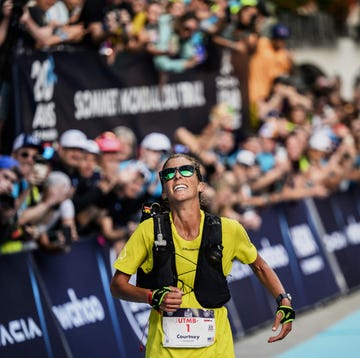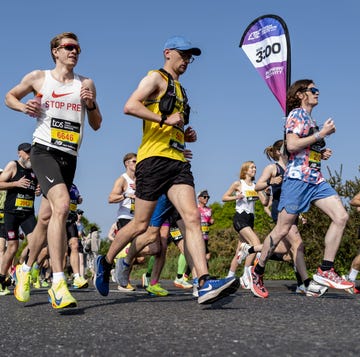Fauja Singh, the oldest-ever person to attain worldwide fame as a long-distance runner, died on Monday 14 July after being hit by a car while on a walk. Singh’s claimed date of birth was 1 April 1911, which would have made him 114 years old at the time of his death, although he did not have a birth certificate.
Singh was said to have both transformed and created world records at the age of 90-plus and 100-plus – and he is credited as being the first person to complete a marathon at the age of 100 and 101. With his flowing white beard and bright orange Sikh turban, he was a crowd favourite at marathons, celebrated in the media, honoured by Queen Elizabeth II, subject of a biography launched in the House of Lords, a torch bearer in the 2012 Olympic Games flame relay, a sponsored elite athlete at major marathons internationally, a high-profile activist for philanthropic causes and co-star of an advertising campaign alongside David Beckham.
This celebrity status came very late in Singh’s long life. When he moved from his native India to London in the early 1990s, with the exact date unknown, he was an obscure Punjabi Sikh trying to alleviate private bereavement, since his wife and two of their adult children had recently died. He lived in Ilford, which is a suburb in east London, with another of his sons.
What everyone's reading
As a young farmer, he was, by his own account, an avid athlete, until the violence that preceded the India/Pakistan partition in 1947 broke out. Because he would have been 36 years old at that date, this already suggests unusual athletic longevity in an era when few athletes, anywhere, competed beyond their early twenties.
Singh said that he took up running again when he was in his 80s. (Again, details vary as to the exact year.) He made his marathon debut in 2000 at the London Marathon – registering then as an 89-year-old – and went on to run that event six times. He clocked his best London Marathon time of 6:02:43 at the age of 92, in 2003.
In fact, 2003 was his peak year athletically, as it was when he also ran the New York City Marathon in 7:34:37 and achieved his most notable performance, 5:40:04, which is recognised as a 90-plus world record, at the Toronto Waterfront Marathon in Canada. His average pace during that run was 12:58 min/mile.
The Toronto Waterfront Marathon was also the venue for his centenarian marathon on 16 October 2011, which he finished in a chip time of 8:11:06. In 2004, he also completed the half marathon in Toronto in 2:29:59, which became the fastest 90-plus mark for the distance.
Toronto also hosted track meets to enable him to rewrite the record books, most notably the Ontario Masters Association Fauja Singh Invitational on 13 October 2011. In one day, he was reported as setting eight 100-plus world records, from the 100m to 5000m.
He returned to the London Marathon in 2012, registered as aged 101, where he recorded a finish time of 7:49:21. Although this was an improvement on his London Marathon time as a 100-year-old, it was also his last marathon – and he retired from competitive events after running the 10K at the Hong Kong Marathon in February 2013.
However, he said that he would continue to run for health and for charity and he remained a popular figure. For example, he was invited to act as honorary starter for the inaugural Birmingham International Marathon in 2017, when his declared age was 106.
Singh has usually been described as a vegetarian, although one interview emphasised that he ate very small portions of a ‘normal Punjabi farmer’s diet’. Singh’s inability to speak English – which meant that he had to communicate through a variety of interpreters and, during marathons, was often interviewed with an interpreter running alongside him – may be the cause of some factual uncertainties. Surprisingly, he was never able to be specific about the exact year in the 1990s in which he immigrated to the UK. The laudatory biography, Turbaned Tornado, by Krushwant Singh, does not resolve that issue.
Singh’s actual performances in marathons, road races and on the track are beyond doubt, because all events had qualified officials, timing equipment and certified courses. Considerable questions remain, however, over the legitimacy of his date of birth, for which his UK passport, first issued in the 1990s, was the only evidence. His world records are therefore not acknowledged by Guinness World Records, which requires an authentic birth certificate. There has been dispute as to whether births were registered in the Punjab in 1911 and, if so, in which language.
There can be no dispute that Singh was an outstanding runner for a man who was evidently very old. His track records at reputedly age 100 included 52:23 for 200m, 5:32:18 for 800m and 11:53:45 for the mile, which is a pace many younger runners would be happy with. He completed 10 marathons at a steady shuffling jog, often under close camera scrutiny and never showing any distress. He used his fame to raise a great deal of money for charities, helped by a London-Indian association wittily named Sikhs in the City. His contribution was remarkable as a role model for immigrant communities, as a man of committed faith and healthy lifestyle, as a ground-breaking senior sportsman and as an inspiration for all older people.















